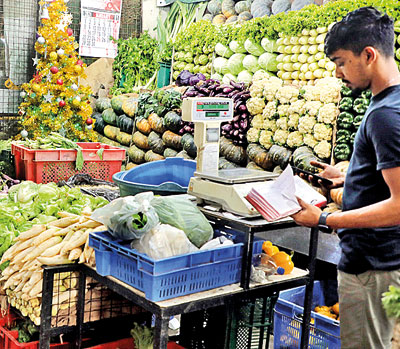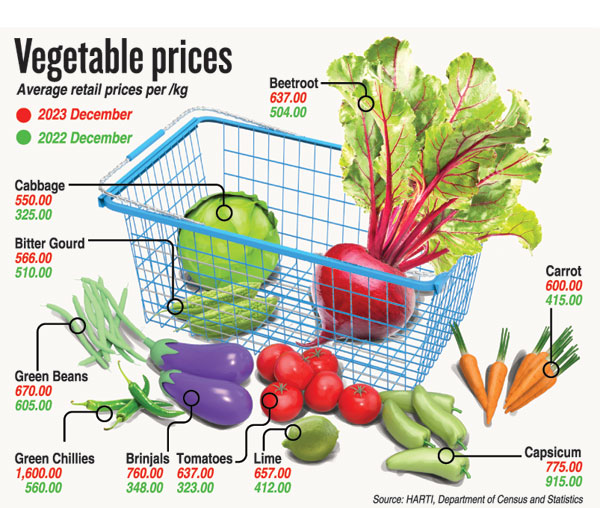News
Veggie prices soar to unprecedented levels
View(s):By Dilushi Wijesinghe
Caught in a whirlpool of econ-omic hardships, farmers across the island continue to suffer as indirect implications of the Value Added Tax (VAT), with further contributing factors such as the weather triggering a dizzying rise in the prices of vegetables.
Although the VAT effective from January 1 does not directly contribute to the price increase, other factors such as the prevailing weather, the VAT on agricultural equipment and fuel, and the increase in transport charges have left the farming community in a deeper, more vulnerable state.

W. M. Gunawardene
The highest recorded prices so far were reported this season. Farmers and traders alike said that this was the biggest price increase seen in many years.
Welimada Uvaparanagama Govijana Union leader W. M. Gunawardene said fertilisers such as urea, triple superphosphate (TSP), and muriate of potash (MOP) are not taxed. However, due to VAT, their prices, which range from Rs 8,000 to Rs 9,000, will increase to Rs 14,000 to Rs 15,000 in the coming days.
“Even the most essential item for a farmer, which is the mammoty, along with fertiliser sprayers, is being taxed,” he said.
“Last week, I bought 100 grams of fertiliser for Rs 9100, but this week it was Rs 10,000,” said Sanath Wijesinghe, a carrot and leek grower in Nuwara Eliya.
The weather has not favoured farmers, and they have suffered substantial losses.
The duty forecaster of the Meteorology Department said that during this Northeast Monsoon from December to February, the island is experiencing unexpected rains due to a shift in winds.
Nuwara Eliya farmers have experienced a continuous downpour for nearly six consecutive months. “The ground does not contain heat for the produce to grow. Not even a flower blooms in Nuwara Eliya,” one farmer said.
The demand for vegetables has notably fallen due to the price increase.
“Prices are crazy. Avocados are over Rs 1,000 a kilo,” said a consumer who made a quick stop to comment on the increase at the Kollupitiya market, which was less busy than usual.
In Colombo, a kilo of green chilli, which has been one of the most expensive vegetables, cost Rs 1,000 in the Manning market. A kilo of onions sells for Rs 480, while a kilo of salad leaves is Rs 2,200.
This week Broccoli, was the most expensive vegetable at Rs 4,200 per kilo in Nuwara Eliya, sells for Rs 5,500 in the Kollupitiya market.
Some growers have left their crops to die, while others turn the remaining unsold vegetables into compost or bury them.
Additionally, the younger generation of farmers has chosen to work as construction labourers.
Mr. Sanath said that he does not grow potatoes because of the risks from rain.

The demand for vegetables has fallen due to the price increase. Pix by M.A. Pushpa Kumara
“I usually harvest about 1,000 kilos of carrots, but this time I was only able to harvest 123 kilos. It’s the same with leeks. From the 7,000 kilos I usually harvest, I was only able to harvest 1,500 kilos.
“I sold a kilo of leeks for Rs 250 today, and the market sells it for more than Rs 280. The middleman earns a good amount of Rs 30 to Rs 50 a kilo for transport and so on,” he said. “We spend months growing the produce, but we get less money than the middleman who earns more than us in one day.’’
At the Keppetipola Economic Centre, a middleman charges Rs 5 if a kilo is less than 100 and Rs 10 if it is more.
Based on the above, a farmer with 1,000 kilos of produce is charged Rs 15,000 as a commission by the middleman.
Moreover, transport fees have increased due to the fuel price increase. It costs Rs 250–Rs 300 to transport 30–40 kilos of produce. However, the VAT on fuel meant the cost nearly doubled to Rs 400–Rs 500.
Transport of produce from Welimada to the Manning Market costs Rs 10 per kilo. However, lorry owners predict that the price may increase to Rs 15 in the coming days.
Last week, fuel prices were revised following the VAT increase:
- LP 95 (octane) was increased from Rs. 426 to Rs. 464.
- LP 92 (octane) from Rs. 346 to Rs. 366
- LAD (auto diesel) from Rs. 329 to Rs. 358.
- LSD (super diesel) from Rs. 434 to Rs. 475.
Additional reporting by K.R. Rajamanthree .

The best way to say that you found the home of your dreams is by finding it on Hitad.lk. We have listings for apartments for sale or rent in Sri Lanka, no matter what locale you're looking for! Whether you live in Colombo, Galle, Kandy, Matara, Jaffna and more - we've got them all!

